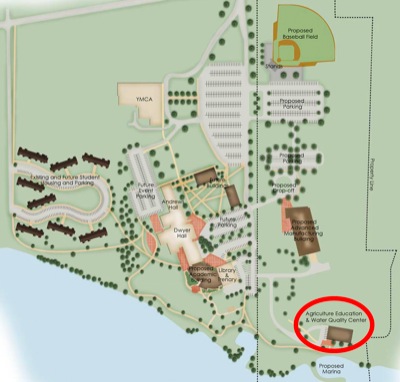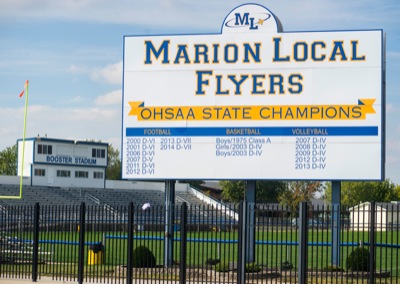Thursday, October 1st, 2015
WSU launches ag education/water quality center
Proposed PACE facility at fairgrounds scrapped
By Shelley Grieshop

Submitted Photo
The red circle designates the area where the agriculture education and water quality center will be located at Wright State University-Lake Campus.
CELINA - The state is diverting $1.5 million from a now-defunct plan to build an expo center at the fairgrounds to a new $3 million agriculture and water quality center at Wright State University-Lake Campus.
Mercer County fair officials on Wednesday confirmed the plan to build the $4 million Progressive Agriculture Convention and Education center has been scrapped. Construction of the multipurpose facility was not set to begin until 100 percent of funding was secured.
Lake campus officials on Wednesday told the newspaper they are proceeding with plans for the agriculture/water quality facility, the first and most significant of several proposed multimillion-dollar projects at the Celina campus.
Initial plans released this spring by university officials listed the now combined programs as separate projects. WSU-LC Dean Jay Albayyari said merging the two programs makes sense because the area's strong agriculture industry has a huge impact on its water quality.
Grand Lake has been plagued for years with blue-green algae that continues to pollute the water, affect tourism and cause millions of dollars in economic losses.
The $1.5 million from the state's capital budget bill - initially allocated by state Sen. Keith Faber, R-Celina, for the PACE center - will be matched by money raised by WSU to fund the campus project, according to Albayyari.
"We're very excited and thank Senator Faber for his vision for an ag center here and tying it to water quality, which is an important issue in our community," the dean said.
The new facility will be located near the shores of Grand Lake and will house laboratories, classrooms, faculty offices and meeting rooms. An architectural design of the building should be completed within the next month and construction could follow in about nine months, Albayyari said.
WSU-LC Business Enterprise Center Director Julie Miller said other universities already use Grand Lake as a "petri dish" to study water quality issues. But currently there is no repository for data, she said.
"With the new center we would have the space to possibly share labs and information," Miller explained.
Albayyari said the center also could be used for other community events.
The ag/water quality center is part of an estimated $25 million expansion project made possible by the university's recent acquisition of 38 acres of land to the east of the lake campus. Other projects in the overall plan include an advanced manufacturing center, an agribusiness/food science program, athletic/recreation complex and a connector building with multifunctional areas including a library/learning center.
The local university is raising one-third of the cost; the remaining dollars will come from Wright State University and state appropriations, Albayyari said.
Sandy Holdheide, student services and public relations director for the local campus, said the number of students enrolled at the campus now totals more than 1,300 and is growing, making expansion plans a necessity.
"Classroom space is at a premium right now," she said.
The percentage of full-time versus part-time students continues to climb. Credit hours per student are up 11 percent from last year, officials said. The number of four-year programs has expanded in the past few years to accommodate demand, Holdheide and Miller explained.
"A lot of this is in response to what's needed in our workforce," Miller said.
Albayyari agreed.
"Most of our programs ... are community driven," he added.
The projects slated for the local campus are linked to WSU's ongoing Rise. Shine. capital campaign, which was launched one year ago with a goal of raising $150 million. Miller said $122 million has been raised so far and "we hope to hit our goal in early 2016."
Greg Homan, an associate professor of organizational leadership and agriculture at WSU and a Mercer County commissioner, said many changes during the past year - including a plan to house all Tri Star Career Compact programs at the WSU-LC - prompted the idea to develop an ag and water quality facility at the campus and led to the termination of the PACE project.
"We (university officials) remain committed to support development efforts at the Mercer County Fairgrounds as they seek to improve facilities to serve our community with a wide range of activities and events year-round," he said. "The fairgrounds is continuing to work on several building renovation/construction projects in their strategic plan."
Fair manager Cara Muhlenkamp said donors who gave money toward the construction of the PACE facility are being asked to reallocate the dollars at the fairgrounds. Earlier this year, officials said about $1 million in direct and in-kind money had been raised.
Muhlenkamp released this statement from the fair board:
"For the last two years, the Mercer County Fair Board has been working on a fundraising effort to build the PACE center, a multi-faceted conference and education center. The effort was designed to provide a large convention/display center as well as classrooms and laboratory space for the Wright State University-Lake Campus agriculture program. The fair board is continuing to focus on an expanded exhibit/meeting space, covering the outdoor horse riding arena to protect from weather, as well as upgrading existing buildings and bathroom facilities on the fairgrounds. The Mercer County Fair Board is proud of their efforts to serve the Mercer County community and is focused on addressing the building renovations needed to make the year-round programs and activities even more successful."


